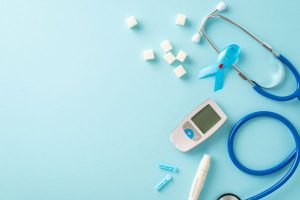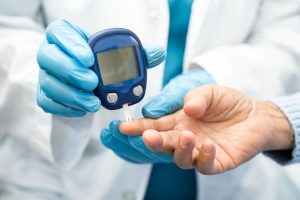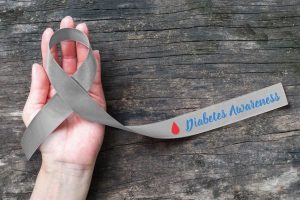By John Nassivera
In consultation with Dr. Ronald Ryan, MD CPE
Oct. 7, 2025
November is National Diabetes Month, which means you have an opportunity to keep your health and the health of your loved ones intact.
You may know someone who has diabetes and is looking for ways to manage their condition. Perhaps you are concerned about having it yourself and want to know how you can prevent it.

Rosen Medical Center is all about helping people live better lives, when not through treatments, then through education. We’re here to make sure diabetes doesn’t keep you from living your best life.
Here is everything you need to know about diabetes and how to prevent or manage it for better health and a better future.
Key Takeaways
What is Diabetes?
Diabetes is a chronic, metabolic disease that surfaces when the body either doesn’t produce enough insulin or can’t effectively use the insulin it makes. This leads to elevated levels of blood glucose (or blood sugar).
There are three types of diabetes to be aware of in your mission of prevention and management:
- Type 1 Diabetes – an autoimmune condition where the body attacks and destroys cells in the pancreas that produce insulin.
- Type 2 Diabetes – the most common type, where the body either becomes resistant to the effects of insulin or doesn’t produce enough insulin to maintain normal blood glucose levels.
- Gestational Diabetes – A temporary form that occurs during pregnancy and usually resolves itself after the baby is born but can increase the mother’s risk of developing type 2 diabetes later in life.

The Importance of Diabetes Awareness
Understanding the severity of diabetes comes from the long-term, life-threatening damage that this disease can cause. Such health problems include a higher risk of heart attacks, strokes, and kidney failure.
Many people with diabetes may also experience damaged blood vessels in the eyes, thus leading to permanent vision loss, according to the World Health Organization. There is also the higher risk of nerve damage and poor blood flow in the feet, which can lead to foot ulcers that can then result in amputation.
The growing number of people with diabetes is another crucial reason for raising awareness. The Centers for Disease Control and Prevention (CDC) estimated in 2021 that 38.4 million people of all ages in the United States had diabetes. This number represents 11.6% of the population at the time.
Of adults aged 18 years or older who had diabetes, 8.7 million were undiagnosed, representing 3.4% of all U.S. adults and 22.8% of all U.S. adults with diabetes.
Diabetes often goes undiagnosed because many people attribute symptoms to other conditions or ignore them altogether. By raising awareness, individuals can recognize the warning signs early and seek immediate medical attention while also making the necessary lifestyle changes.

Common Symptoms
The first step on the path to better health is keeping an eye out for symptoms of diabetes. Common warning signs for the disease include:
- Frequent urination
- Excessive thirst
- Unexplained weight loss
- Increased hunger
- Fatigue
- Blurred vision
- Slow-healing wounds or infections
- Numbness or tingling in the hands or feet
- Frequent infections (e.g., gum, skin, or urinary tract)
- Nausea or vomiting
If you or someone you know is experiencing these symptoms, get tested right away.

Screening Protocols
Another way you can get ahead on diabetes prevention and management is through early screening.
Adults are advised to get screened every three years, regardless of symptoms. The CDC currently recommends that adults start testing for prediabetes and type 2 diabetes at age 35.
Risk factors that encourage screening for adults include:
- Being overweight or obese
- Family history of diabetes
- Sedentary lifestyles
- High blood pressure or abnormal cholesterol
- History of gestational diabetes
- Polycystic ovary syndrome (POS)
- Giving birth to a large baby (over nine pounds)
- Belonging to certain ethnic groups (e.g., African American, Hispanic, Native American, Asian American, Pacific Islander)
Children and teenagers are recommended to get screened for diabetes if they are overweight and have at least one other risk factor.
Rosen Medical Center routinely tests for prediabetes regardless of age to help keep your health in check.

The Importance of Regular Checkups
Waiting for symptoms of diabetes to appear to take action will only give diabetes an upper hand on your health.
Even if you feel fine, regular health check-ups can help you catch diabetes early and find the solutions necessary to prevent it.
If you already have diabetes, routine visits with your doctor help monitor blood sugar levels and address potential complications to your health. With a better treatment plan, you can do a better job at keeping your condition under control.

Diabetes Prevention
While there is currently no known way to prevent type 1 diabetes, type 2 and gestational diabetes are preventable with the right changes in your lifestyle. These changes can also make it easier for people with type 1 diabetes to manage their condition.
One solution is weight-loss, for which the American Diabetes Association recommends people with prediabetes to cut at least 5% to 7% of their body weight to prevent the disease.
A diet that avoids sugar and saturated fat can also lower your risk of diabetes. The key is to focus on fiber-rich foods such as fruits, non-starchy vegetables, and whole grains, as well as unsaturated fats such as olives, nuts and seeds, tuna, and salmon.
Another way to prevent type 2 and gestational diabetes is to fill each day with more physical activities. Aim for at least 150 minutes of moderate aerobic activity per week, such as brisk walking, swimming, or biking. There’s also the option of at least 75 minutes of vigorous aerobic activity per week, such as running or swimming laps.
Strength and balance training two to three times per week can also help your quest for better health. Sitting for less time is another way to control blood sugar levels. Whether you’re at home or at work, use your breaks to stand up for a few minutes or walk around and do some light activity.
With a more active lifestyle, not only is diabetes less of a problem, but your body can also enjoy weight loss, greater sensitivity to insulin, and a brighter future for your heart.

How You Can Spread Awareness
Each of us has the ability to reduce the harm that diabetes can cause to the world’s health. All it takes is the initiative to spread the word.
Talk to your family, friends, and community members about diabetes and encourage them to get screened, especially if they are dealing with risk factors.
Look for diabetes awareness campaigns in your neighborhood to see how they are taking action, especially for World Diabetes Day on November 14. If there isn’t one, there’s no better time to start a campaign yourself than now.

Looking Towards a Healthier Future
Diabetes can be managed, as well as prevented in some cases. You can improve your outcomes of fighting this disease the earlier you act.
By educating ourselves, talking to professionals, getting regular check-ups, and encouraging others to do the same, we have a healthier future to look forward to.
Visit Rosen Medical Center today and talk to our team about how to keep your health as your most valuable asset.


